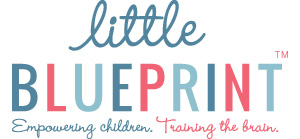
When Katherine Eskovitz’s 3-year-old son suddenly stopped sleeping, she tried every trick in the book. But it wasn’t until she wrote her own that her little guy started snoozing — and her business, Little Blueprint, was born. Based on brain science, the personalized storybooks help littles understand and adapt to life’s changes big (divorce, illness) and small (going to bed, celebrating holidays).
While nursing a bottomless cup of coffee, we asked Eskovitz to tell us her family’s bedtime story.
Sleep (or the lack thereof) might be the most universal parenting challenge. What happened in your house?
I think every parent has that moment when the whole family is thrown off by lack of sleep, and the world starts looking bleak. For me, it was when my son started jumping out of his crib and I lost all hope of getting him back to bed at that rude, presunrise hour. And as he started losing sleep due to this new excitement, it became harder and harder for him to go to bed at night.
What did you try first?
I bought a sleep tent (I don’t even think they make these anymore). But he learned to unzip the tent and jump out! So I started sewing the tent every night. I kid you not. But he would yank and yank until he tore the tent open. This went on for several weeks. My husband thought I was going crazy. I needed a new plan.
Ha. No judgment. So what was the breakthrough?
I started reading every book about sleep I could get my hands on, which led me to books on brain science and child development. I decided to create a storybook for Dylan that took him through all that I had learned, but I had to make it simple enough for a toddler. That’s when I came up with the concept of empowering him to develop his own bedtime plan.
Toddlers and strategic planning don’t exactly go together. Why were you so intent?
In essence, when children practice planning, it’s like learning to ride a bike without falling over every time you hit a bump in the road. Since we as parents are not always there to steer the bike, children need early and regular practice to learn a feel for the road. With Dylan, I felt that by making him part of the solution, he would embrace the process and work with me to help himself. And scientific evidence supported the theory.
Okay, so how’d you do it?
We started talking about why sleep is important, how he felt when his body was tired, why I was impatient when he didn’t go to bed, and what is hard about saying good night. Then we brainstormed ways to wind down each day (writing or drawing in a journal, playing a quiet bedtime game). And he created his own bedtime plan.
Go, Dylan! What does bedtime look like for you and your kids now?
It’s very predictable. We read for about fifteen minutes, then dim the lights and play “two truths and one fake.” (Each of us takes turns telling two things we really did that day and one thing we make up.) It’s a relaxing way to talk about the day and clear our minds. Sometimes the kids will opt instead for a three-minute relaxation recording. We always finish with either my husband or me sitting for five minutes in a rocking chair before a good-night hug and kiss. The kids may choose different bedtime activities during our 30 minutes, but they know that we begin at 7 and end with the lights out at 7:30.
How did your bumpy bedtime road affect the way you parent?
It’s something I’ve translated into all areas of my children’s lives. When we encounter a new situation, I try to give them anticipatory guidance but let them develop their own age-appropriate plan. I’ve created many “Have a Plan” storybooks for my children, and over the years friends started requesting them for their kids. When a friend of a friend of a friend who suddenly learned she needed a double mastectomy asked for one to help prepare her kids, I decided it was time to launch the business.
We find that with every parenting success, we also have a totally humbling moment. What was your latest reality check?
This is so true! Just this week I went to the farmers market with my daughter, and she chose a special cookie to bring home as her treat for the day. The next day, I was craving a sweet, and there was the cookie uneaten, so I figured she wouldn’t remember and I ate it. When she came home from school, she saw the cookie was gone and was very upset. My now 8-year-old son turned to me, shaking his head, and said, “That’s just bad parenting!”
Photos: Courtesy of Sharon Suh
http://www.dailycandy.com/everywhere/article/168080/A-Childs-Sleep-Problem-Solved
